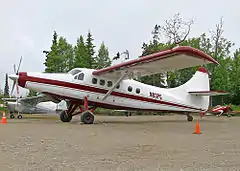2013 Rediske Air DHC-3 Otter crash
On 7 July 2013, a single-engine de Havilland Canada DHC-3 Otter, operated by air charter company Rediske Air, crashed on take-off at Soldotna Airport, Alaska. The sole crewmember and all nine passengers on board were killed.
 N93PC, the aircraft involved in the crash, in 2011 | |
| Accident | |
|---|---|
| Date | 7 July 2013 |
| Summary | Stall and crash on take-off |
| Site | Soldotna Airport, Soldotna, Alaska, U.S. |
| Aircraft | |
| Aircraft type | de Havilland Canada DHC-3 Otter |
| Operator | Rediske Air |
| Flight origin | Soldotna Airport |
| Destination | Bear Mountain Lodge, Chinitna Bay, Nikiski, Alaska |
| Occupants | 10 |
| Passengers | 9 |
| Crew | 1 |
| Fatalities | 10 |
| Survivors | 0 |
Aircraft
The aircraft involved was a de Havilland Canada DHC-3 Otter with serial number 280 which was originally delivered to the Royal Canadian Mounted Police Air Division on 25 February 1959 with Canadian registration C-FMPX. From 1979 to 2010 it operated commercially for various companies across Canada. In 2005 it was fitted with a Garrett TPE-33-10R turbine engine, and was re-registered in the United States in 2010 as N93PC.
Crash
According to the United States' Federal Aviation Administration and local law enforcement officials, the aircraft "struck the runway and burned" shortly after take-off, before 11:20 a.m. AKDT (19:20 UTC), killing all ten people on board. It was flying to an unspecified fishing lodge.[1] The National Transportation Safety Board was called in to investigate the cause of the crash.[2][3]
In addition to the pilot, the crash killed nine people from two families visiting Alaska from Greenville, South Carolina. The victims' ages ranged from 11 to 74.[4]
The weather was reported to be cloudy at the time of the accident.[5]
Investigation
There were no eyewitnesses to the accident.[5] The incident aircraft was not equipped with a flight data recorder.[6] Investigators found that a passenger had recorded the takeoff with the camera of his mobile phone. Due to the absence of any other recorded data, the NTSB decided to reconstruct the trajectory and speed of the airplane based on the recorded video. The analysis was challenging, since the camera was hand-held. By applying image analysis and 3D computer simulation, the NTSB was able to first estimate the time-varying orientation of the camera and then the location and orientation of the airplane. The NTSB report found: "The analysis revealed that shortly after takeoff, flight speed started decreasing rapidly and angle of attack started increasing rapidly. Approximately 11 seconds after takeoff, flight speed and angle of attack reached levels corresponding to stall."[7]
References
- D'oro, Rachel (9 July 2013). "Father of victim: Family killed in crash was vacationing in Alaska". Associated Press. Minneapolis, MN: StarTribune. Retrieved 9 July 2013.
- Lenz, Cristy; Marsh, Rene (8 July 2013). "10 killed in Alaska air taxi fire". CNN. Retrieved 8 July 2013.
- Hardan, Sara J. (7 July 2013). "10 killed in Soldotna plane crash". Peninsula Clarion. Archived from the original on 11 July 2013. Retrieved 8 July 2013.
- Torquiano, Neil (8 July 2013). "Passengers Killed in Soldotna Plane Crash Were from South Carolina". KTUU-TV. Archived from the original on 10 July 2013. Retrieved 8 July 2013.
- Anderson, Ben (8 July 2013). "NTSB arrives to investigate deadly Alaska plane crash". Alaska Dispatch. Retrieved 12 July 2013.
- Anderson, Ben (9 July 2013). "Few new details emerge in Soldotna plane crash investigation". Alaska Dispatch. Retrieved 12 July 2013.
- NTSB Video Study on N93PC crash (PDF), 1 July 2014, retrieved 3 October 2014